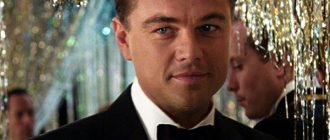The beginning of life's journey
Nikita Mikhalkov was born on October 21, 1945 in Moscow into a family of people who were directly related to creativity. His father (Sergei Mikhalkov) was a famous writer, and his mother (Natalia Konchalovskaya) was a writer, poet and translator.
At school, young Mikhalkov was called a barchuk because of his regular stories about famous relatives. The fact is that Mikhalkov really has noble roots, which he is very proud of. He says the following about people:
When everyone destroys the temple, someone must stay inside to sing! If everyone is running forward, someone must remain in the house to help the sick and give water to the thirsty. There are few such people, they live unnoticed and disappear just as unnoticed. They are like air...
Nikita Sergeevich is also a writer and singer. His creative collection includes several published memoirs, as well as journalistic and historical works. And in some films Mikhalkov performed the songs himself. He jokingly says about the peculiarities of the acting profession:
Fans saw Nikita Mikhalkov’s grandson, Alexander, for the first time
Honey blonde and other fashionable shades for fair-haired people: spring 2021 trends
“He wrote such letters!”: Dobrovolskaya spoke about life with Efremov
It is impossible to work in cinema without humor. Then, after the first picture, you begin to consider yourself a genius, and no one will turn you away from this disastrous path.
Cinematic smiles at shows are worthless. This is just a demonstration of the work of dentists.
About the Oscars, LGBT and Dear Comrades
— Nikita Sergeevich, you already mentioned the Oscar.
Usually, before the end of September, the Russian Oscar Committee announced the film that would represent Russia at the Oscars. There's silence for now. Taking into account the new requirements that will be presented in the main category, do you think Russia should now send its films to the Oscars? “It’s not for me to decide, this is a matter for the national Oscar committee, but as for today’s situation in general - globally, my personal point of view - it’s time for us to just stop talking to them. With the USA, with the EU, with the European Parliament. They have absolutely lost their shores, they are behaving completely boorishly towards us. They have forgotten how to speak humanly. Their task is to prove to the world that we are a huge, evil, barbaric country.
And until they cancel the declaration that the Second World War was started by the Soviet Union together with Hitler's Germany, we have no right to talk to them at all simply out of respect for the memory of those who died saving the same civilized world . In this I completely agree with the opinion of Yakov Kedmi, the ex-head of the Israeli intelligence service Nativ. They betrayed their ideals. All. Religion, culture, history.
— Do you mean the entire Western world?
- Yes. He betrayed his ideals. When the Berlin Film Festival stops giving prizes for male and female roles, what are we talking about? Can you imagine a normal person going to an LGBT film festival? For example, I consider myself a normal person. I have nothing to do there, not because I hate or despise them. I'm not interested. This does not fit into any of my ideas about life, about family. Well, no way! At the same time, I do not intend and do not have the right to interfere in the personal life of everyone and do not advocate restrictions on anyone’s freedoms, but I absolutely support, for example, an amendment to the constitution on what is called a family. And I also protest against the fact that from early childhood children are plunged into the devilry of independently determining whether a child is a girl or a boy. In this situation, I personally don’t know which picture I need to vote for in order to like it.
— There are no such conditions for a foreign film. But everyone said that the absolute, one hundred percent favorite was “Dear Comrades” by a well-known director.
- Yes, probably. I really like this picture.
Memories of Mom
In his autobiographical book, Nikita Sergeevich mentioned all the people dear to him. A separate block includes memories of my mother. Here are some of her wise sayings:
If something falls into your hands just like that, and you can reach out and take it without any cost, think how many out of ten people would refuse it. If you count more than five, refuse.
Never scoop everything out completely without hearing the scraper touch the bottom.
Be afraid of people for whom power is a dream. Follow those for whom power is a cross!
In 2003, a documentary film was released in honor of the 100th anniversary of Natalia Konchalovskaya. The director and producer was Nikita Mikhalkov. He also wrote the script. In this film he tried to put all his love for the woman who raised both him and his older brother Andrei Konchalovsky correctly. Nikita Mikhalkov speaks about his mother:
“I have access to social networks”: Alsou spoke about raising her daughters
Hilary Duff spoke about her character Lizzie Maguire and the cancellation of the show's reboot
Roman Kurtsyn and Lyubov Aksenova will meet in Bali: the comedy “Walk, Vasya - 2”
When she was gone, I realized with a piercing force what she was for our family, what a reliable core, what a powerful force attraction, what protection, what amazing creative energy...
After the release of the first film, in which Nikita played the main role, he had an attack of star fever. The young man covered the walls of his room with his own photographic portraits. But the mother weaned her son from narcissism with one phrase. She said:
Be ashamed. Take an example from your ancestors.
We will lose this war and die: Nikita Mikhalkov about the attempt to destroy Russia
After a rather long break, director Nikita Mikhalkov recorded a new episode of the Besogon program under the intriguing title “Who is not blind, sees.” The author himself dispelled all the intrigues, showing the serious problems of our society - everything that happens behind the door in the Looking Glass. We will lose this war and die, Nikita Mikhalkov made it clear.
In almost two months of silence from Besogon, a lot has happened; many important and “hot” topics have accumulated. Among them, the great Victory Day and the large-scale parade dedicated to it are, of course, joyful and festive events.
But there were also very sad ones, such as the tragedy that occurred in Kazan, where a former graduate came to his school with a gun and started a bloody massacre. The victims of 19-year-old Ilnaz Galyaviev were seven schoolchildren and two teachers who were trying to protect the children. About three dozen more victims were hospitalized. This nightmare happened on the first day of school after the long May holidays.
The killer, having completed his bloody “deed,” did not commit suicide, although he planned to do so. Deciding to save his life, he knelt down and surrendered to the authorities. Ilnaz did not repent of his deeds and did not plead guilty according to “his own law.” At the very first interrogation, he calmly stated that “he hoped that he had killed everyone he shot at,” and that the wounded remained only because “he was not convinced that they were dead.”
The killer who committed the bloody massacre at the Kazan school did not repent of his crime and did not admit guilt according to “his own law.” Photo: vk.com/region_kazan116/Globallkookpress.
This tragedy immediately shook our society, giving rise to many versions about the reasons for what happened. As usual, people's opinions quickly diverged to different poles. Some demanded the lifting of the moratorium on the death penalty for such criminals, others said that it was necessary to tighten the licensing system, and others believed that the killer did not act independently, but under the influence of someone, that he had instructors from the Darknet, who convinced to commit mass murder.
And alongside all these versions there were absolutely absurd conspiracy theories. Here, for example, is what blogger Kamikaze said back then: “My theories about the reasons for what happened in Kazan are increasingly being confirmed, and I no longer have any doubts that yesterday’s shooting in Kazan was organized by the security forces, and the extreme this Ilnaz is brainwashed.”
Nikita Mikhalkov could not even immediately find the words to characterize such a comment:
Do you realize... the abomination of this - “the murder was deliberately committed by the National Guard, and this guy was made extreme”? History begins to acquire mythology, speculation, and fantasies. But I don’t want to talk only about this event as an event. It seems to me that the question here is much broader. The question is one of cause and effect, how one follows from the other. Why is this happening.
Children are raised not even by the street, but by the Internet
After this tragedy, many began to talk about the need to increase the age for obtaining weapons from 18 to 21 years. One would imagine that at the age of 21 Ilnaz would suddenly become different and something would change in his brain or heart? No one can give such guarantees, Mikhalkov is sure. The guy should have been raised earlier.
Pavel Astakhov thinks about this :
The problems of our school began earlier, from the moment the short-sighted officials who led this area decided to expel education from the school process, freeing the class teachers from this responsibility, leaving everything to the family and the street. But today it is not the street that raises children. And not even family. And the Internet.
Every schoolchild today has his own gadget, Astakhov continued. And do we understand that our children, when faced with problems, difficulties or negative attitudes, turn with questions and for protection not to their parents or teachers, but to social networks, bloggers, streamers. They are looking for help and protection on the Internet, the lawyer emphasized. But in fact they fall into the following trap.
Let’s take a break from “Besogon” for a moment. I would like to remind you that experts also spoke about the problems of education on the air in Constantinople. In the “Interview” program, the head of the Center for Crisis Psychology, Mikhail Khasminsky , noted that people most often commit actions that correspond to their worldview. And our schools, unfortunately, have not formed ideological constructs for a long time:
There is no ideology, and today we don’t even know where we are taking our children, what goals we are setting for them. That's the problem.
Let's return to Nikita Mikhalkov's program. The director is sure that one way or another, but we have to return to the old topic of education and upbringing. According to him, the very word “education” has practically disappeared from our everyday life, and education in its current form largely contributes to the fact that such tragedies will continue to occur.
Death of formats? No, this is the death of education
Nikita Mikhalkov repeatedly raised the topic of education “as it is” in Besogon. Exactly a year ago, in an episode entitled “The Catcher of Lies,” the director told us about the Education Foresight 2030 project. With every frame of that episode, the “gates of hell” were revealed, into which liberal reformers want to lead through global digitalization, finally turning education into a “service sector” for raising future generations with a “set of competencies” instead of full-fledged knowledge.
For example, in the section “The Death of Formats” it is said that by 2025 the diploma of education and the original textbook should disappear, and after another 20 years it is planned to “kill” secondary schools, texts (books and articles) as “the dominant form of knowledge communication " Even earlier, the teacher will have to disappear, replaced by “artificial intelligence in the role of a mentor.”
Mikhalkov spoke about terrible things, and in response he was accused of being retrograde and prone to “deep conspiracy theories.” And few people heard the warning about what consequences such a soulless “reform” would lead to.
Maybe they don't want to hear. Maybe they can’t hear,” Nikita Mikhalkov suggested. – But these are very clear and simple things. Well, don’t we really understand what kind of person we will see as a result of this upbringing? Who will he be, what will he be like? <…> The most important, the most important interest is only the parents. Why do you think parents are silent? No. No! They are crying out. They express their point of view. And who hears them? Who understands them? Who is trying to hear and understand them?
Digital Autism Epidemic
The director recalled the scandalous – literally – meeting of the Committee on Information Policy and Information Technologies, held in the State Duma at the end of May. Anna Shwabauer , a candidate of legal sciences and a member of the expert advisory council on family law issues of the Federation Council, who took part in this event, tried to convey to ministers and deputies the position of the parent community on the unacceptability of imposing digitalization, but heard in response that the state does not have money to provide rural schools teachers, but there is money for digitalization.
Anna Schwabauer took part in a meeting of the Committee on Information Policy and Information Technologies held in the State Duma. Screenshot: Constantinople.
Anna had to read her report in a very unpleasant environment; she was in a hurry to say the most important thing, while feeling that they did not want to listen to her, noted Nikita Mikhalkov.
And this was really so. By the way, Mrs. Schwabauer herself commented on this moment on the air of Constantinople:
They didn’t quite hear me and didn’t want to hear me. As you saw, the minister chuckled when I voiced scientific data. There was such concern: why are the government laughing at scientific data? We demand from our authorities that they discuss with us how to educate our children. By law, we have a priority right to raise and educate our children. But for some reason we are not consulted at all when digitalization is being introduced into schools.
It can be assumed that in the words of Anna Schwabauer we simply see the emotions of a concerned parent. But that's not true. Psychotherapist Andrei Kurpatov .
For example, at the World Economic Forum in Davos in 2020, he spoke about the impact of excessive digital consumption, using the harsh wording “digital autism epidemic”:
This is a condition when young people cannot maintain long-term psychological contact with each other. They are not interested in the inner world of another person, other people have become replaceable for them, because they do not see the value of each of them individually. <…> We are, in fact, experiencing not only a division of the world into rich and poor, but also into smart and stupid.
And what? Has anyone heard this warning? Nobody! Digitalization is moving further and deeper.
Of course, Mikhalkov continued, now they will tell us again: you are against numbers, against artificial intelligence: “It’s not like that at all, it’s not like that. We are against dependence on numbers. We are against dependence on artificial intelligence,” exclaimed the director.
Artificial intelligence should not replace the soul of a people, its culture, its human individuality, created by God. And it is against this human inside each of us that we are now fighting for life and death,” Mikhalkov is sure. “And we are still losing this war.”
Textbooks are written as if they are not about us
And here the author of “Besogon” brings viewers to another important topic about history textbooks, which are published in our country under the wing of the Ministry of Education. In this area, everything is so sad that even President Vladimir Putin had to comment on the topic in his address to the Federal Assembly on April 21. And this was one of the most emotional parts of his speech:
I still, you know, open some textbooks. I am surprised to see what is written there. As if it's not about us. Who writes, who misses?! Marvelous. Anything is written there. And about the second front... only nothing is said about the Battle of Stalingrad. I don't even want to comment.
This is indeed a very serious problem that has been talked about for several years. But the cart, as they say, is still there. Nikita Mikhalkov recalled one of the 2021 editions of Besogon, in which the author spoke about textbooks that instill hatred of one’s own country and admiration for other countries, it’s easy to guess which ones.
The issue also discussed what, according to billionaire philanthropist George Soros , the “transformation of the humanities” should look like. Under the slogan of “the fight against communist ideology,” information about the Battles of Kursk and Stalingrad should be completely removed from history textbooks.
And such benefits still exist. Suffice it to recall the loud scandal that broke out around Oleg Volobuev’s “History of Russia and the World” for the 11th grade, in which the author, among other things, claimed that in Kiev in 2014 “there was a revolution, not a coup d’etat.” Only one line is dedicated to the Battle of Stalingrad. Meanwhile, the manual was agreed upon by the Ministry of Education and even received its recommendation.
And then we are surprised by the generation of TikTok consumers who have grown up with all this, who do not know history, and have only heard about the Great Patriotic War, and then in the best case. For them, the Holocaust is the name of some spirits, and for some reason the Motherland monument is located in Rostov-on-Don, and maybe even in Germany.
If in schools reformers are ready to drive children to “digital autism,” then in higher education there are other problems. And here again the ears of the benefactor Soros stick out.
How and how liberal “values” are promoted in Russia
The American philanthropist, speaking at the Davos forum in 2021, announced the “most important project” of his life - the creation of a network of Open Society universities*. George Soros has donated a billion dollars to promote liberal values and free societies.
As we remember, at the end of February of this year, the head of the Accounts Chamber, Alexei Kudrin, said that the existing education system in Russia is bad, so it needs to be broken down and a new one built. But don’t think that Kudrin is concerned about the return of the classics of Russian education, it has not happened at all, his vector is firmly liberal. He believes that Russia needs “Liberal Arts and Science programs, or, as we call them, liberal arts and sciences.”
To this end, he decided to withdraw the Faculty of Liberal Arts and Sciences from St. Petersburg State University and create a separate university of liberal arts. And Kudrin plans to simply name the new educational institution “Smolny.”
What is the connection here, asked Nikita Mikhalkov. But there is a connection, and it is quite clearly visible. The Faculty of Liberal Arts appeared as a result of the implementation of the common idea of Bard College (USA) and St. Petersburg State University, which arose in 1996. At the origins was Leon Botstein , a long-time and close friend of George Soros, whose structures “Open Society” and “Assistance” in 2015 were recognized by the Prosecutor General’s Office of Russia as undesirable organizations that threaten the constitutional order of our country.
In this regard, Nikita Mikhalkov quotes from an essay by journalist Roman Nosikov :
In other words, the St. Petersburg project is supervised by a person whose educational institution in the United States lives on Soros’ millions. And, of course, such connections could not but affect the teaching staff of the free faculty, the future “free university.”
Nosikov suggests taking a closer look at the teaching staff of the Kudrinsky Faculty.
For example, senior lecturer at the Department of Problems of Interdisciplinary Synthesis in the Field of Social Sciences and Humanities Daniil Kotsyubinsky . Here's what he writes on his Facebook page:
“A person who identifies himself with something huge that does not notice him even when he steps on him with a boot is tragicomic. As you guessed, I’m talking about love for big homelands.”
Another character is associate professor of the department Ilya Utekhin . His social network page is full of links to Meduza*, FBK*, as well as Bellingcat, Colta, BBC, The Bell and publications by Alexei Navalny.
Historical projects are led by the real pearl of Bard College - American historian Sean McMeekin, who became famous for his works in which he blames Russia and the Russians for all the ills of humanity.
His most scandalous creation was the book “Russian Roots of the First World War,” published ten years ago. According to the author, this war was also “started by the Russians,” and not by Germany and Austria-Hungary. As for the Second World War, McMeekin is sure that it was “wanted and brought closer” by Generalissimo Joseph Stalin , and not by Fuhrer Adolf Hitler .
“Thus, it is approximately clear what kind of history will be taught at the Free University,” writes Roman Nosikov quite rightly.
They are ready to deal a fatal blow to everything - to symbols, to our memory
And is it then any wonder that our children are moving the “Motherland” monument to Germany, and many have little idea of the role of their country in the victory over fascism? Moreover, in September 2019, the European Parliament recognized the USSR as being responsible for the outbreak of World War II, putting our country on the same level as Nazi Germany.
OK then. There are still people alive today who remember something, who lived then, who were taught, who know the truth about that war. And what will happen in 20 years, when these people leave? What will remain in the memory of those who were raised today by TikTok?
– asks Nikita Mikhalkov. It turns out, he continued, that without any guns, air raids, submarines in the current mental war, you can strike a fatal blow to everything: to symbols, to memory, to everything dear, close, dear. For everything that, one way or another, is our country. Having gone through incredible tests over all these centuries. And especially for the twentieth century.
And now, before our eyes, mourners are appearing. These are our contemporaries. And these are not people who are on TikTok. These people are quite mature. Which are, as it were, brought up by that country. Nikita Mikhalkov suggested listening to what the Russian and Israeli journalist, prose writer, teacher and columnist for The New Times magazine, winner of the 2010 Moscow Helsinki Group Prize Viktor Shenderovich :
Between us and Hitler we started this war. We brought blood and suffering to many peoples and our own, of course, first of all. But also to many peoples of Europe. We bear full responsibility for the outbreak of – the USSR – the Second World War. This is a historical fact.
I wonder how Mr. Shenderovich would evaluate a lampshade made from the skin of his relatives, which would hang in the office of some Obersturmbannführer, if we had lost this war, asked Nikita Mikhalkov. In this case, Shenderovich himself would hardly have been born. But we somehow ignore this, and if we don’t let it pass, then a tsunami, an earthquake, a squall begins. And here it is appropriate to recall the words of the Prime Minister of Tsarist Russia Pyotr Stolypin :
In Russia, from time immemorial, the attitude towards government power has always been critical. There is hardly another country in the world, except Russia, where dissatisfaction with the government would be so persistent and chronic. The government in Russia is responsible for everything, even for what the country itself does within itself, in the depths of its spiritual and economic life. Either it has brought it, or it does not know how to curb it and direct it onto a healthy path. And the government will begin to take measures, call for work, order - new cries: tyranny, trampling of freedoms, and so on.
Peoples who do not realize their national tasks perish
Continuing the program, Nikita Mikhalkov again decided to touch upon the topic of ideology, which is very painful for our liberal community. In 1993, the word “ideology” was generally prohibited as a concept in the Constitution, because we were frightened by the fact that there was a communist ideology, and there were repressions and other nightmares.
“And ideology is just an agreement between people on what laws they should live by,” says Mikhalkov. – Despite the fact that any ideology, even the most incredible, is allowed here. But national ideology – no, it is prohibited, I repeat. It’s not just not welcome, but prohibited.”
Here's what Stolypin said about this:
People sometimes forget about their national tasks. But such peoples perish, they turn into soil, into fertilizer on which other, stronger nations grow and grow stronger.
But ideology is the awareness of our national tasks.
To conclude Nikita Mikhalkov’s thoughts, I would like to return to the tragic topic with which he began his “Besogon” program - the bloody massacre in Kazan. Commenting on the tragedy in an interview with Tsargrad, the head of the Center for Crisis Psychology, Mikhail Khasminsky, said:
We raise infantile egoists with ambitions, with a high level of aspirations - they are like the navel of the earth. And then they imagine themselves as gods, living with a complete ideological mess in their heads. We ourselves form in children the idea that everything is allowed to them, that no one can tell them. It's like a car with one gas pedal and no brakes. We need to deal with the child’s internal state. A person does only what suits his worldview. A person must have an internal structure, a core that will not allow him to become interested in Columbine, or end up in a suicide group, or anything else. But we don’t have an education system.
* "Open Society" is recognized as an undesirable organization that threatens the constitutional order of our country.
* FBK – Anti-Corruption Foundation, included in the register of NPOs performing the functions of a foreign agent.
* Meduza is a media outlet recognized in Russia as a foreign agent.
About famous roots
We mentioned above who his parents were. But they are not the only ones widely known. His paternal grandfather (Sergei Vladimirovich Mikhalkov) was a writer, poet, screenwriter, and war correspondent. My maternal grandfather (Pyotr Konchalovsky), as well as my uncle (Mikhail Konchalovsky) and great-grandfather (Vasily Surikov) were artists. Mikhalkov's children became successful and recognizable actors. Only the first-born Stepan did not connect his life with theater and cinema, but became a restorer.
Nikita Mikhalkov says: “The feeling of origin has never disappeared in me. Even when I didn't realize it existed, it was there. I felt it like the sound of vital juices in a tree... This is very important. You know that you can bend under the changeable wind, freeze in the winter cold, you can even fly away like a yellow leaf in the fall. But this main thing is always with you. You know that you exist. And you are not alone."
Nina apologized to the pensioner for the noisy party. The neighbor's reaction was surprising
What do children look like when the mother is Russian and the fathers are of different nationalities: photos of sisters
A huge asteroid will approach Earth on the vernal equinox
Career
Many viewers remember Nikita Mikhalkov for his roles in the films “Station for Two,” “Siberiada,” and “Cruel Romance.” He started acting in films at the age of 14. The first roles were episodic, but this is also experience. The first major role and the beginning of his acting career was the film “I Walk Through Moscow” (in 1963). It was she who influenced Mikhalkov’s decision to enter the Shchukin Theater School. True, in his fourth year he was expelled because he took part in filming, which was prohibited. But the expulsion did not stop him from enrolling as a director. Mikhalkov says:
Success is a variable quantity. You should not try to turn it into a permanent one, try to score the maximum number of points on the wave of luck. In case of success or failure, you need to move on.
As director N.S. Mikhalkov made his debut in 1974. In general, over the years of his career, he took part in many projects (as an actor, director or screenwriter). Here is his statement:
I realized that this is one of the wisest rules of life: to approach what happens with simple humility. Not with passive despondency, but with humility. Assessing everything that happens, you need to calmly draw conclusions and continue living and working.
Kristina Asmus told how one of her working days went
Why Pavel Derevianko did not marry the mother of his children, and how he lives now
Only bees and bumblebees: principles of growing strawberries using the Finnish method
Nikita Sergeevich wrote scripts for the films “Trans-Siberian Express”, “Hate”, “My Favorite Clown”, “The Lonely Hunter”. He says the following about our time:
We live in times of change. This is amazing and very sad. Today, with the help of the media and the Internet, you can convince the viewer, reader, listener that such and such an object (painting, piece of music, film) is a new word in painting, music, cinema, that it has amazing depth, incredible talent and much more. other.
Talented in everything
Nikita Mikhalkov has a long life journey of 75 years behind him. Every phrase said by this man conceals his personal experience and wisdom, which he is ready to share with the world. He says:
Don't be like a dog that barks at you. You don't get on all fours and bark back, do you? It's best to ignore it. Then she will fall behind.
He looks at many things more simply now than in his youth. He is not prone to stereotypes and self-flagellation. It happened, so you need to survive it (both good and bad).
Now he can no longer exercise regularly, but exercises every morning and life without elevators are still included in Mikhalkov’s schedule. Here is another phrase of his:
You say that education is very important. One day I’m walking along Tverskaya. There are girls of easy virtue. They recognized me. One of them asked for an autograph... And thanked her with the words: “Thank you, Nikita Sergeevich, I was brought up watching your films!” Here's the story.
Mikhalkov is also a successful entrepreneur. He started by founding the TRITE film studio, then became a co-owner of a winery in Italy, a shareholder in a diamond mining corporation, an owner of forest land and a shareholder in an IT enterprise. In 2015, Mikhalkov opened the Academy of Theater and Cinematography and registered the brand with his brother. At the same time, Nikita Sergeevich is a co-founder of the Russian Cultural Foundation.
Mikhalkov: “We are experiencing a division of the world not only into rich and poor, but also into smart and stupid”
After a long break, a new episode of Nikita Mikhalkov’s Besogon TV has been released, in which he again raises issues of education and the future of the country. The author of the program asks the question: why did the tragedy occur in Kazan and how can such tragedies be prevented? Should we just raise the gun ownership age? But this will do nothing if nothing is changed in the minds of teenagers. They will kill not from the age of 18, but from the age of 21. Therefore, the key to solving the problem is education and upbringing.
“The problems of our school began when short-sighted officials decided to ban education from school education, leaving it to the family and the street. Only today it is not the street that raises children, or even the family, but the Internet. Did you know that today every school-age child has a gadget? An entire year of pandemic has forced our children to learn remotely. Did you know that when faced with problems, difficulties, negative attitudes, our children turn to social networks with questions not to their parents and teachers? They look for help on the Internet, but fall into a trap. We ourselves are destroying the education and upbringing system with our own hands,” Mikhalkov cited the speech of former children’s ombudsman Pavel Astakhov.
This problem was recently mentioned by the chairman of the board of the association of software developers "Domestic Software", a member of the expert council on Russian software at the Ministry of Digital Development of the Russian Federation, Natalya Kasperskaya, who said as accurately as she succinctly: every child has a window into the criminal world in his pocket.
But the point is not only in online crime, which at the very least they are fighting, but in the education system itself, from which education has been expelled. The educational system itself is crippling children. One of the mothers said this very accurately in the program:
“When you talk about education, I would really like you to think not about “high technologies”, but about the future of the country - our children. Not a single “high technology” will give a population that can reason, analyze and draw conclusions. It turns out that our state does not need thinking, reflective people.”
Absolutely correct comment. What technologies did Plato and Aristotle have? According to the apt statement of the British mathematician and philosopher Alfred Whitehead, all philosophy is notes in the margins of Plato’s works. Which, by the way, spoke about the primacy of ideas, not things. And Aristotle? He created logic that we have been using without change for 2.5 thousand years.
Mikhalkov recalls the contents of the Education 2030 foresight project. It clearly announces the “death of formats”: by 2025, graduation diplomas, the system of scientific journals, and the author’s textbook should disappear. And by 2035, it is planned to destroy the secondary school, the research university, and text in general as the dominant form of knowledge communication. What does it mean? According to the plans of the developers, a reasonable person who thinks, reads and writes should be replaced by a person who has fun, is stupid and stares at the visual images that the digital system will palm off on him? The focus is on the word itself as the basis of human intelligence. All this is actually called simply: the destruction of man.
Death of formats, foresight education (2020)|Photo: BesogonTV
In principle, the normative image on television and on the Internet has long been that of an entertaining moron. Now the element of crime, degeneracy, perversion is actively being added to it and the aesthetics of self-destruction is being promoted. And digitalization plays a major role here, because it allows all this to be done under the guise of reforming education. This is gamification, that is, the replacement of learning with entertainment, “learning” on social networks (does anyone in their right mind believe that a child will learn lessons on a social network?) and in general digitalization itself, which is nothing more than the destruction of real education. Social networks are fighting against destructive content. So digitalization itself is a purely destructive policy. Anna Schwabauer spoke about this in the State Duma on May 27, as Mikhalkov showed.
The Minister of Digital Development of the Russian Federation, Maksut Shadayev, then openly stated: there is no money for rural schools and for teachers. But there is something for digitalization. As for the speech of the famous expert Anna Schwabauer, she told everything that she has been constantly talking about in recent years - about the destruction of education by digitalization, which is imposed by force, without any discussion, along with all sorts of “digital profiles” and, in fact, the abolition of a living teacher. She cited a number of opinions from different scientists about the dangers of being tied to gadgets for learning. “This is a blow to our children’s cognitive analytical abilities,” she concluded.
“Have you noticed how quickly Mrs. Schwabauer reads her report. How does she feel that no one wants to listen to her? Because those who organized the round table don’t like what she says,” said Mikhalkov (we also paid attention to this in our material).
He cited the speech of psychotherapist Andrei Kurpatov at the Davos Forum 2021.
“We have an epidemic of digital autism. This is a condition in which young people are unable to maintain long-term psychological contact with each other. They are not interested in the inner world of another person. Other people have become replaceable for them because they don’t see value in them,” the doctor said.
Kurpatov spoke about the results of a major 2017 study on how gadgets affect a person’s mental abilities. Three groups of students were given tasks. One group did not have a phone, another had it in their pocket, and the third had it face down in front of them. It turned out that simply having a phone nearby sharply reduces the brain’s working memory and “fluid intelligence,” as illustrated by the corresponding graphs.
“You become stupid when you have a phone with you. In essence, we are experiencing a division of the world not only into rich and poor, but also into smart and stupid,” Kurpatov concluded.
They have been talking and writing for a long time about the fact that even simple visualization makes a person stupid. Thus, the famous science fiction writer and “philosopher of technology” Stanislav Lem wrote back in the 1990s that children become “victims of the visual information transmitted through television that constantly bombards their brains.” This was back in the early days of the Internet. What would he say today? Although Lem already saw clearly then: the network is not used for education, but for the cretinization of people (Lem’s expression). And even for purely educational purposes, electronic media have, in addition to their advantages, insurmountable disadvantages. Snatching and displaying pieces of text on the screen prevents a person from concentrating, and therefore interferes with thinking and learning. It is noteworthy that this was argued by a rationalist to the core.
Mikhalkov also discusses how anti-values are gently imposed on children. In one of the Sberclass tasks, children are asked to place punctuation marks in the following sentence: “Not all people strive for continuous communication; for many, loneliness is of great value, because alone with yourself you can be real and not try to meet someone else’s expectations.” This is how loneliness attitudes are introduced. It's amazing that Lem compared digitalization to a plastic copulation doll. It literally separates people and accustoms them to surrogates. Instead of live communication - a gadget, instead of family and communication - virtual sex, etc.
It is curious that Mikhalkov mentioned the planned creation of the University of Liberal Arts and Sciences in St. Petersburg, which was previously announced by an experienced liberal and the head of the Accounts Chamber, Alexei Kudrin. This will be a university within the Open Society University Network of George Soros, whose foundation has been recognized as an undesirable organization in Russia.
The program also provides numerous examples of children becoming stupid by the reformed education system, from which everything useful has been expelled. Many children no longer literally know anything except entertainment on their gadget. Their brains are destroyed by entertainment and debauchery and they cannot formulate a single thought. Their minds are controlled by some degenerate bloggers. And this is no coincidence. Why don’t the media write and talk about people who create something: workers, people of the earth, scientists? – asks Mikhalkov. As a result, we get stupid, aggressive and Russia-hating teenagers and young people.
What can be opposed to this? Mikhalkov does not answer this question. He always emphasizes that he asks questions first. This is also important. After all, education is, first of all, the ability to ask questions. Because a correctly posed question is already half the answer. Is this why the current system is trying so hard to eradicate the desire to ask questions from people? This is very clearly manifested in two current campaigns - digitalization and vaccination. There, “extra” questions are generally considered a sign of hostility and the machinations of ill-wishers. And a “wrong opinion” will easily be declared “fake.” Minister of Education Sergei Kravtsov said in response to data about the dangers of gadgets for children’s health: “I’m officially telling you that this is fake.” That's the whole conversation: whoever disagrees with us will be declared a "fake".
The eminent physicist Werner Heisenberg said that education is what remains after everything that was taught is forgotten. What did he mean? What is important is not information, which is easier to get today than before, but the ability to think. But no technology can teach you this. This is what Mikhalkov said: he is not against technology, he is against the destruction of education.
We will not give our answers either. The only thing that suggests itself is that it’s time to stop relying on officials. Children are “new oil” for them. They are people only for parents. Do the parents themselves understand this and are they ready to do something - that’s the main question. Perhaps it is no less important than the question of what to do with the education system.
Don't forget to share the news on your social media pages below.










